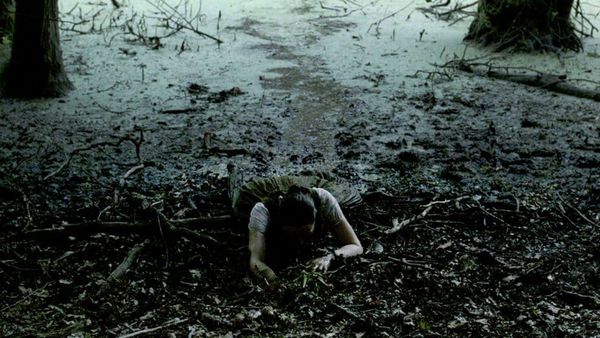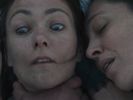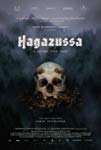Eye For Film >> Movies >> Hagazussa - A Heathen's Curse (2017) Film Review
Hagazussa - A Heathen's Curse
Reviewed by: Jennie Kermode

In the small wooden house on the hill, with thick snow all around, the old woman and the girl are one another's only support. The woman is ill - there are visible plague sores on her arms - but this is not the only danger. In the dusk, strange figures stalk around the edges of the glade, men wearing the skins and heads of beasts. After dark, flames flicker close to the windows. Somebody shouts out that they should be burned alive.
Christianity arrived in what is now Germany in the 5th Century but it would take another thousand years before it could truly say that it had driven out the spiritual traditions that preceded it. The process was slow and often ugly; not everyone succumbed to conversion. Although mass burnings were much rarer than many people now think, there were many easier ways to get rid of those who were socially rejected and seen as a threat. Pushed to the margins, they were exposed to many dangers with no-one to turn to for support.

We see the girl again years later, after the woman has died. She - Albrun (played by Aleksandra Cwen) - is an adult now with a child of her own, a tiny infant girl who seems destined to carry on a matriarchal tradition. She keeps a trio of goats, the milk helping to feed the child as her own dries up and providing her with something she can sell in the nearby village, when people there are willing to deal with her at all.
Albrun's interactions with the goats tell us much about the cultural differences between her and the villagers. Her relationship with them is sensual, almost sexual. Though she's obviously lonely for human company, we get the sense that she doesn't see humans as significantly different from the rest of nature. Although the villagers are Christians the legacy of Paganism lingers in their spaces too. A church that seems half carved out of a rock face is walled with human skulls. From this place, Albrun obtains the skull of her mother, placing it where it can watch over her child. She also receives a warning.
Unfolding like an old folk tale, Hagazussa is full of subtler warnings and moments where quiet desperation makes it all too easy to choose the wrong path. Often it's the sweetest things, the moments of hope, that lead to destruction, and ultimately Albrun will be driven to become something much more like the witch that the villagers see her as. The pace of the story is deliberately slow, bearing up the weight of stifled histories. Lukas Feigelfeld's imagery is lush and evocative, sometimes verging on the psychedelic. Again, it hints at a difference in cultural perspective. Alone, especially when under pressure, Albrun experiences the world in a dreamlike way. Colours blur into one another; lines shift uncertainly. Crisp, sharp visuals give way to the equivocal, the numinous.
The dialogue here is sparse. What is there to say? Small events build upon one another in a way that seems inevitable. Albrun moves like a cornered animal. Feigelfeld invites us to shed our own rational, modern perspective and to see omens everywhere. Simple on the surface, this is a film full of deep, dizzying currents, an intimate story and yet a fitting testament to the end of a world.
Reviewed on: 18 Apr 2019















